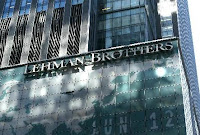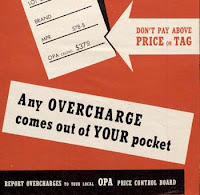Wednesday, June 25, 2008
Monday, June 23, 2008
Forbes - Thanks But No Thanks
 I was recently contacted by Forbes.com manager Sharon Gitelle to join the best of breed Forbes Business and Financial Blog Network. My first reaction was "Wow, Forbes wants me to join their blog network! Forbes!" What's the catch? Ah, the catch. Well, for one I have to plaster a 728 x 90 leaderboard ad on the top of my page, PLUS either a 160 x 600 or 300 x 250 ad along the side of my blog. Forbes will pay me 40% of all net revenues collected from click throughs from my site (that's 40% after they deduct unspecified agency fees, ad serving fees, and network support fees). If my blog generated, oh, say 30,000 or 40,000 visitors per month, it would be worth it to plaster my blog with ads. But I just don't believe that the few bucks I might make would be worth destroying the aesthetics of this blog. I've researched the results that others before me have obtained, and the reaction was universally disappointing. Besides, my intent was never to make this blog into a money making venture. It's done to support my signing agent business, and it's done because it's a passion and a pleasure. That's why I've resisted Google Adsense up until now as well. So thanks Forbes. I appreciate the offer and I'm flattered that you like my little corner of the blog world. But I'll pass for now.
I was recently contacted by Forbes.com manager Sharon Gitelle to join the best of breed Forbes Business and Financial Blog Network. My first reaction was "Wow, Forbes wants me to join their blog network! Forbes!" What's the catch? Ah, the catch. Well, for one I have to plaster a 728 x 90 leaderboard ad on the top of my page, PLUS either a 160 x 600 or 300 x 250 ad along the side of my blog. Forbes will pay me 40% of all net revenues collected from click throughs from my site (that's 40% after they deduct unspecified agency fees, ad serving fees, and network support fees). If my blog generated, oh, say 30,000 or 40,000 visitors per month, it would be worth it to plaster my blog with ads. But I just don't believe that the few bucks I might make would be worth destroying the aesthetics of this blog. I've researched the results that others before me have obtained, and the reaction was universally disappointing. Besides, my intent was never to make this blog into a money making venture. It's done to support my signing agent business, and it's done because it's a passion and a pleasure. That's why I've resisted Google Adsense up until now as well. So thanks Forbes. I appreciate the offer and I'm flattered that you like my little corner of the blog world. But I'll pass for now.
Friday, June 20, 2008
Quicken Loans Cuts 250
FBI Cracks Down Hard On Mortgage Fraud
 Housing developers.
Housing developers.Mortgage lenders.
Brokers.
Lawyers.
Real Estate Agents.
Appraisers.
(Hmm, no notaries?)
In a widespread crackdown on mortgage fraud, federal authorities indicted hundreds of individuals spanning a multitude of occupations in an attempt to allay fears and protect home buyers from predatory lenders. In addition, two former Bear Sterns fund managers who sold mortgage-backed investments were also arrested on conspiracy and securities fraud charges. The indictments come in the wake of allegations regarding democratic Senators Christopher Dodd and Kent Conrad, who received cut-rate home loans from Countrywide. The indictments also follow high profile arrests in Chicago, Atlanta, Houston, & Miami as part of Operation Malicious Mortgage.
“It makes clearer that the causes of the credit problems are very broad-based and can’t be put at the feet of one player,” said Mark Zandi, senior economist at Moody’s Economy.com.
Wednesday, June 18, 2008
Monday, June 16, 2008
Will Lehman Brothers Be Bailed Out Next?
 Much like Bear Sterns, investment bank Lehman Brothers was thought to be well insulated from the plight that other banks have faced during these difficult times. But as it was with Bear Sterns, that isn't the case after all. Lehman Brothers posted a $3 billion loss Monday, their first loss ever since going public in 1994. It's been a turbulent week for Lehman Brother, which this week raised $6 billion in fresh capital and unexpectedly demoted two of its top executives. Lehman Brothers continues its attempt to cut exposure to residential mortgages, commercial mortgages and real estate investments.
Much like Bear Sterns, investment bank Lehman Brothers was thought to be well insulated from the plight that other banks have faced during these difficult times. But as it was with Bear Sterns, that isn't the case after all. Lehman Brothers posted a $3 billion loss Monday, their first loss ever since going public in 1994. It's been a turbulent week for Lehman Brother, which this week raised $6 billion in fresh capital and unexpectedly demoted two of its top executives. Lehman Brothers continues its attempt to cut exposure to residential mortgages, commercial mortgages and real estate investments.
Tuesday, June 10, 2008
MBA - Treat Mortgage Bankers & Mortgage Brokers Differently
 Mortgage Brokers have long chided regulation disparities between brokers and bankers. But The Mortgage Bankers Association recently released a policy paper which once again distinguishes the role differences and emphasises the need for greater disclosure by brokers regarding fees and yield spreads due to their intermediate status in the loan process. In addition, the MBA feels that bankers are already subject to greater supervision and regulation than brokers.
Mortgage Brokers have long chided regulation disparities between brokers and bankers. But The Mortgage Bankers Association recently released a policy paper which once again distinguishes the role differences and emphasises the need for greater disclosure by brokers regarding fees and yield spreads due to their intermediate status in the loan process. In addition, the MBA feels that bankers are already subject to greater supervision and regulation than brokers.According to the MBA report, “Because broker compensation is directly tied to a loan’s interest rate and brokers lack an ongoing financial stake in loan performance, brokers have a high incentive to get loans closed, maximize fees for origination, and move on to their next transaction.”
Friday, June 6, 2008
Alternative Income - Merchandising
 Rebecca Fair is at it again. First she put together a comprehensive list of field inspection companies and sites. Field service inspectors provide on-site property inspections for lenders, loan servicers and investors (see the April 21st post). Now Rebecca has compiled a list of over 100 companies that hire merchandisers and demonstrators. From Rebecca's website:
Rebecca Fair is at it again. First she put together a comprehensive list of field inspection companies and sites. Field service inspectors provide on-site property inspections for lenders, loan servicers and investors (see the April 21st post). Now Rebecca has compiled a list of over 100 companies that hire merchandisers and demonstrators. From Rebecca's website:Merchandisers assist manufacturers in setting up anything from coupon displays, magazines, books and cards to impulse buying and POP stands. There are thousands of products and hundreds of companies that need to hire Independent Merchandisers to replenish the stock in their displays.
If you're looking for supplemental income, these extensive lists can be purchased for a nominal fee from her website.
Wednesday, June 4, 2008
RESPA Reforms - Comments Extended
HUD Releases Report On Closing Costs
 HUD recently completed a study of closing costs using a national sample of FHA-insured, 30-year fixed-rate home purchase loans. Some of the results are disappointing, but likely not surprising to many. Among the findings:
HUD recently completed a study of closing costs using a national sample of FHA-insured, 30-year fixed-rate home purchase loans. Some of the results are disappointing, but likely not surprising to many. Among the findings:People who got loans through brokers paid $300 to $425 more in closing costs than those who got them directly from lenders.
African Americans paid an additional $415 and Latinos paid an extra $365 on average.
Borrowers in neighborhoods where all adults have a college education are charged $1,100 less than borrowers in neighborhoods where no adults have a college education.
For those who need some bedtime reading material, the 270 page report can be downloaded at huduser.org.
Monday, June 2, 2008
What's Covered Under Errors & Omission Insurance?
 Although most companies require signing agents to carry errors & omission coverage, many are still unclear about what E & O insurance covers. Notary E & O insurance covers losses from notarial acts related to errors, omission, or negligence during the notarizing of documents which can include improperly identifying a borrower or an improper or missing stamp or seal. E & O does not cover errors related to non-notarized functions and documents that are a large part of what takes place at a signing. And notary bonds do not protect the notary, they protect the public. Some companies seem to be trying to fill that gap by recently offering signing agent E & O insurance. The USNA and SigningAgentInsurance.com both offer signing agent errors and omission insurance (this is not an endorsement).
Although most companies require signing agents to carry errors & omission coverage, many are still unclear about what E & O insurance covers. Notary E & O insurance covers losses from notarial acts related to errors, omission, or negligence during the notarizing of documents which can include improperly identifying a borrower or an improper or missing stamp or seal. E & O does not cover errors related to non-notarized functions and documents that are a large part of what takes place at a signing. And notary bonds do not protect the notary, they protect the public. Some companies seem to be trying to fill that gap by recently offering signing agent E & O insurance. The USNA and SigningAgentInsurance.com both offer signing agent errors and omission insurance (this is not an endorsement).


